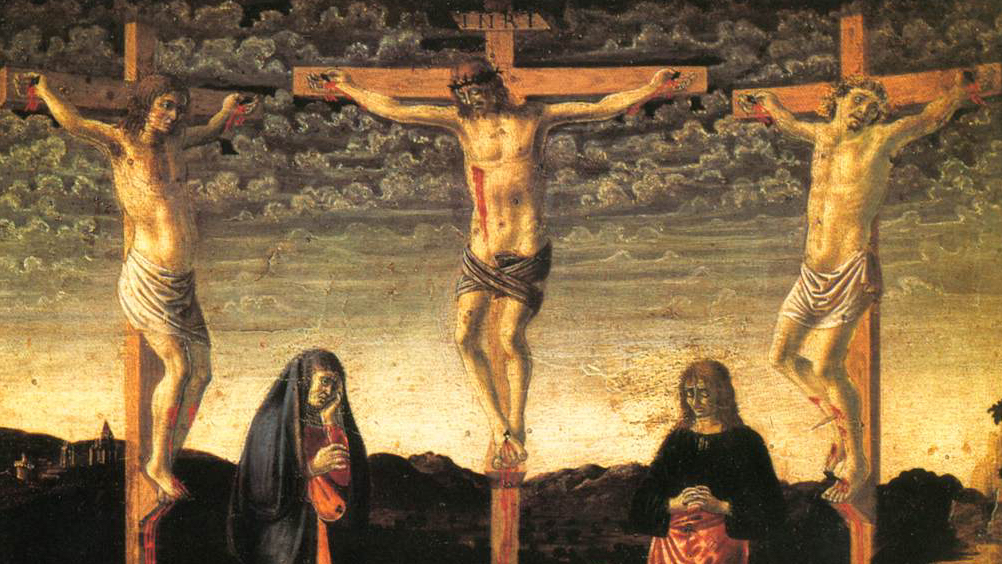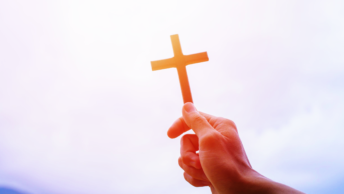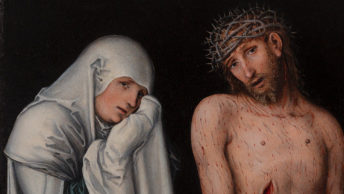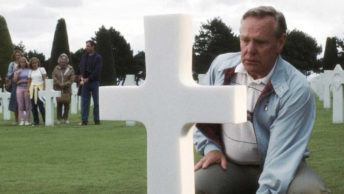In the Jewish Passover ritual, the youngest child asks “What makes this night different from all other nights?” The ritual continues by expounding upon the salvation history of the Jewish people describing how Moses led the people of Israel away from Egypt and toward the promised land. In the year 2013, we can ask ourselves a similar question, “What makes this Good Friday different from other years?”
In some senses, this Good Friday is the same as all others. However, given the events of the past several months, it is different. This year, we have a new Holy Father, Pope Francis. This year, there are many economic difficulties not only here in the United States but around the world. This year, we have significant legislative and judicial decisions which are in the process of being made. While the ritual of Good Friday remains the same, the context in which it is celebrated changes from year to year.
There are three aspects to the Good Friday liturgy: word, symbol, and sacrament. We cannot help but to think about the events around the world as we participate in the Good Friday liturgy. In each of these three aspects, the person of Jesus Christ is made manifest to us; albeit not completely, for the revelation of Jesus Christ will only become clear in the kingdom of God.
Word
The first aspect of the Good Friday service is word. In the liturgy of the Word of Good Friday the focus is on the passion of our Lord Jesus Christ. In the liturgy we see how Jesus becomes the Christ. The first reading is from the Fourth Servant Song of Isaiah. In this reading, Isaiah describes the human aspect of the servant of God. Early commentators applied Isaiah’s words to the ministry and person of Jesus Christ. At the beginning of the passage, the servant is described as being ordinary; in fact so ordinary, that people would not even take notice of him. To quote from a popular musical Chicago, Jesus or the servant could be described as “a cellophane man.” That is to say, someone whom others would look right through and not notice. However, toward the end of the passage we read how because of the servant’s obedience, his affliction became salvific: his suffering took away the sins of many and won pardon for their offenses. The human Jesus becomes the divine Christ.
We are called to be like the servant in Isaiah’s passage. Our actions have import. Our actions can bring about peace and justice. Our actions can affect salvation. Provided that our actions are in concert with God’s will. Jesus became human so that human beings could become like God. In the year 2013 we are encouraged to really focus on the message of Isaiah. As we celebrate Good Friday this year, we ask ourselves the question, “How do my actions make Jesus Christ present to the world?”
The responsorial psalm of the Good Friday liturgy reminds us of our destiny. We should commend our whole lives to God. Ultimately, whatever happens to us, we trust in God. This is the essence of the Divine Mercy devotion. At the bottom of that famous icon are the words “Jesus I trust in you.” Therefore, we should never feel abandoned or alone because God is always with us.
The second reading from the Letter to the Hebrews invites us to practice obedience. Obedience brings about perfection. Because of Christ’s perfect obedience, we may have confidence when we approach God’s throne of mercy. Moreover, obedience that is lived can itself become salvific. When we follow the commands of the Lord; when we practice works of charity and virtue; when we participate in the sacraments, in response to being obedient to the love of God, we draw others closer to God by our example.
John’s version of the passion of Jesus Christ focuses on time, details, and kingship. In contrast to the passion accounts of the Synoptics, John’s version gives many details especially in regards to time that help us to have a more visual experience of the passion. In addition, the writer relates many details which are not found in the other versions of the passion account: for example, the name of the servant of the high priest, the place of the judge’s bench, how the soldiers divided his clothing, and more details about Joseph of Arimathea.
But the most striking aspect of John’s account of the passion refers to the kingship of Christ. From the beginning of the passion account through the end, we see how Jesus and God are in charge. In the garden, Jesus uses the formal name for God “I am” which shows that he is God’s Son. When Jesus is questioned by the high priest, he speaks in a way that displays his authority. In addition, Jesus has a conversation with Pilate in which he gets the upper hand, perplexing Pilate himself. Even when Jesus is hanging on the cross dying, he still is in charge and makes Mary his mother the mother of the Church and the Beloved Disciple the image of the Church. When he finally does die with the words “It is finished,” he does so with the dignity of a king.
In the year 2013, the passion of Jesus gives us the opportunity to reflect on the qualities of kingship. True kingship, true royalty is not found in wealth or power or prestige. Rather true kingship is found in servanthood. In the current day when so many people are suffering it is easy to see the contrast between wealth and poverty. However, true wealth is not found in terms of money or possessions, instead it is found in our ability to see in another person the face of Jesus Christ.
We are called to examine how we view the person of Christ. This will determine how we treat others. Moreover, as demonstrated by our newly elected Pope, the Church is invited to be a servant to the world. Just as Christ was servant to his disciples and was slave to those who killed him, so too should the people of God be willing to serve the world.
Symbol
The second part of the Good Friday liturgy consists of the adoration of the Cross. In this ritual, the faithful are invited to demonstrate their love for the wood of the cross on which hung the Savior of the world. The cross is a powerful symbol. 2000 years ago it was a symbol of terror and death. It was used as a weapon to subjugate people and to force them to bow down to a foreign power. It was used to keep people in line. In the year 2013 the cross is a symbol of salvation. However, for some who are Christian, the presence of the cross exposes them to torture and execution. In Iraq for example, many Christians are being driven from their homes because of Muslim oppression. In some parts of the world, Christians are killed simply because they are Christian. While for most of us the cross is a symbol of salvation, for some of us, it is a death warrant.
When we venerate the cross this Good Friday, we should be conscious of the many people for whom the cross becomes a reality. Their belief in Jesus Christ is the cause of their persecution. People are still being crucified for their beliefs even in the year 2013. We are invited in our prayer and in our action to work for peace and justice for all peoples. However, working for peace and justice does not mean rolling over and letting people take advantage of us. Nor does it mean watering down our own beliefs and convictions in an effort to “get along.” If we are to truly bring about peace and justice in the world we must remain faithful to our calling as Christian men and women and not be afraid to stand up for truth. In addition, we must learn to be authentic human beings who truly practice what we preach.
Sacrament
The reception of Holy Communion comprises the third part of the Good Friday liturgy. Good Friday is the only day of the Church year in which the Mass is not celebrated. Instead, we celebrate what is known as the liturgy of the pre-sanctified. The Communion that we receive was consecrated at the Liturgy of the Lord’s Supper on Holy Thursday. Although the priest and deacon dress to celebrate Mass, no Mass is celebrated. Rather, we have an extended liturgy of the word which includes ten intercessions. These are followed by the Adoration of the Cross which really takes the place of the Eucharistic prayer. Then both priest and people receive the Eucharist as a reminder that they are receiving the crucified and resurrected body and blood of Jesus Christ.
In the Eucharistic prayer, our celebration history is presented in brevis. On Good Friday we focus on that supreme act of sacrifice that brought about our salvation. The veneration of the Cross leads us to the celebration of the reception of Holy Communion. We “fast” from Mass today, but we do not fast from the Eucharist. Although we do not participate on this day in the transubstantiation of the bread and wine into the Body and Blood of Christ, we do commune with the Lord. In a particular way, we attempt to configure ourselves more closely to Christ each and every day. On Good Friday, we remind ourselves that just as Christ suffered so too must we suffer; just as Christ died so too must we die; however, we hope that as Christ was resurrected so too may each one of us be resurrected and achieve eternal life.
When we receive Holy Communion this day, we should do so with a profound sense of duty that we truly become what we eat; namely, the living body and blood of Christ. Just as Christ became one of us, so we are to become like Christ to the world. This means we must be like a servant. This means that we must have a heart filled with love and compassion. This means that we must have the courage of a king. In the midst of suffering and oppression, we must stand tall and be steadfast in order to be true to our convictions.
What makes this Good Friday different from all others? The answer to that question depends on how we view Christ and how we view ourselves. Each one of us is called to use our talents and gifts in such a way that God’s presence in the world is made manifest. This means taking a stand for truth and justice even when it is contrary to public opinion or even if it may mean ridicule and or death.
Just as the servant in Isaiah’s writing was someone who was unnoticed, so too are we called to be someone who, though ordinary, can do extraordinary things provided that we do them as God wills.
May this Good Friday be for each of us a time of transformation and the time of intense unification with Jesus Christ. May the words of the Scriptures penetrate our hearts. May our adoration of the cross move us to real action in the world. And may the reception of Holy Communion remind us of our communion with one another and of our union with Christ.








